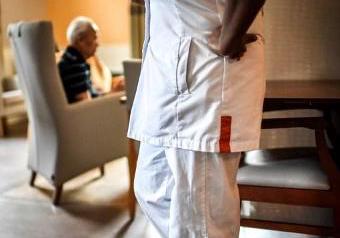A large majority of residents and staff in nursing homes have antibodies against the coronavirus, according to a study carried out between February and March by the universities of Ghent, Liege, Leuven and the Sciensano public health institute, which relayed the information on Wednesday.
When it comes to residents, 69% of those studied have antibodies, while 80% of staff do.
A random sample of 1,640 residents and 1,368 staff members were tested in 69 Belgian nursing homes between 1 February and 24 March.
During this period, 96% of the residents and 85% of the staff had received at least one dose of vaccine, while 68% and 48% respectively had been fully vaccinated.
For KU Leuven, ULiège, UGent and Sciensano, the difference in the presence of antibodies between residents and staff could be explained by a decreased and/or slowed capacity to produce antibodies following vaccination, but they added that this study does not allow them to validate that hypothesis.
Another study, carried out in Flemish nursing homes last November prior to the start of the vaccination campaign, showed a higher number of residents (19%) than staff members (15%) with antibodies against the coronavirus.
The comparison of the two studies could therefore possibly indicate a poorer immune response after vaccination in the elderly, the universities and the public health institute think.
Still, national figures show a clear decrease in hospitalisations and mortality among nursing home residents since the start of the vaccination campaign.
The percentage of nursing home staff with antibodies is comparable to that of health professionals in Belgian hospitals and frontline health care providers, researchers point out.
According to Sciensano and the three universities, these results show a positive impact of the vaccination campaign in Belgian nursing homes, even though the campaign had not yet been completed at the time of the study.
This study will continue until next December, with a test of all participants every two months in order to follow the evolution of the presence of antibodies against the coronavirus over time.
The information gathered could help determine the need for a new dose of vaccine and the timing of its administration in this category of the population, as Sciensano has recently said they’re considering giving the group a third coronavirus dose.
The Brussels Times

